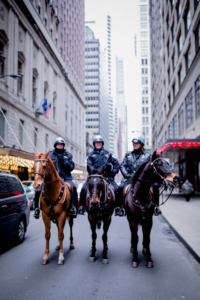
- admin
- May 12, 2020
- 11:42 am
- No Comments
Essential Attributes Of Effective Police Leaders
Leadership in any public service office is vital to ensuring that the department runs appropriately. Effective leaders create effective teams that can accomplish goals and reach targets. When it comes to civil service jobs, reaching goals is also about setting a tone for the way that officers treat the public.
Police officers, in particular, have a lot of responsibility on their hands. They’re entrusted with the safeguarding of communities and the public. While all members of the force undergo extensive training and consistent evaluations throughout their career, dynamic leaders must create an environment where ethical behavior supersedes everything else.
If you’re considering going into the police force, you should have the ability to use these values in your everyday life. Who knows, you could be a lieutenant or a captain before you know it.
Instilling The Right Values
Police leaders must take the time out to set a proper value system for their subordinates. Instead of trying to lay down the law by making employees abide by strict rules, try and guide them into understanding the value of essential principles.
If you focus on making the importance of punctuality and time management well-understood, your officers will start coming in on time automatically. Slowly, your department will transform into a well-run machine.
Leading By Example
The best way to do the above is to make sure that you’re not a hypocrite. If you ask your supervisees to come in on time, you should be there as well. If subordinates see their boss not following the same rules that they lay out, they won’t respect them, and they’ll stop following the rules as well.
Setting an example applies to how you do the job as well. If you establish a flexible hierarchy, where you’re respectful of patrol officers or administrative staff, then your detectives and other mid-rank workers will follow suit. This also creates a sense of togetherness and is effective for building team spirit.
Being Humble
Humility is never a bad thing — and a humble boss is one of the best personas to have. Make sure that you’re not arrogant or overbearing with your staff. Treat them with the same deference that you want them to afford you. Staying humble is essential for all police officers because their job is to serve the public.
By behaving respectfully with all levels of employees, including administrative or maintenance staff, you will be able to create an egalitarian office environment. This will start becoming part of the way your police officers deal with civilians as well.
Create Trust
Have your officers’ backs. A leader who doubts their employees won’t get respect in return. While you don’t have to always agree with the way that your colleagues do things, trusting them to be able to do their jobs is essential.
When you show them that you trust them to pursue a case without hovering over their head or questioning them about every decision, they’ll be more likely to listen to you.
Integrity Matters
Always make sure you emphasize hard work over everything else. Police work is tough and rigorous, and many officers may slack off on essential parts of the job. Supervise paperwork and evidence filing carefully so that your subordinates know you’re keeping a check on them.
 If faulty work leads to a larger problem, use that moment to teach people why integrity with their work is so important. Remember, a good leader shows as well as tells.
If faulty work leads to a larger problem, use that moment to teach people why integrity with their work is so important. Remember, a good leader shows as well as tells.
Behave Like A Mentor
The best way to lead people is to behave like a mentor rather than a boss. A mentor makes sure that they develop a good relationship with their staff, rather than acting as a superior. In a mentorship leader position, you would preferably work with your employees to help them be better rather than enforce it upon them.
Constructive Communication
Communication is key to any good relationship, and a working relationship is no different. However, communication should be done constructively. Instead of only communicating the problems in somebody’s behavior or their work, share the good things too.
When you do communicate criticism, try to make it constructive. Don’t use words like “always” and “never.” Explain why you need things done a certain way rather than just telling them to do it. These techniques will foster goodwill between you and your colleagues.
Promote Teamwork
A police department should work as a team, and an effective leader should encourage team bonds. Try and conduct team-building exercises to break the ice. Don’t play favorites. Make sure that if one team member is struggling, someone else is assisting them.
 Eventually, there will be enough camaraderie between your officers for there to be a synergy in the department. Synergy in a team means that more work gets done in quicker times because everyone has the other person’s back.
Eventually, there will be enough camaraderie between your officers for there to be a synergy in the department. Synergy in a team means that more work gets done in quicker times because everyone has the other person’s back.
Knowing Your People
Make sure you know your department. It’s not enough to just come in, do your job and leave. Your staff and officers are human beings outside of their work as well. Get to know them better. For example, as a police captain, you should know some personal details about your detectives, such as if one of them is more research-focused, while another works better on the field.
These details will help you understand each officer’s style and figuring out whom to assign what work to will become easier. This way, you will also be able to identify leadership material.
These values will come to police officers slowly, but it all starts with the training to get into the police force. At Civil Service Success, we offer a range of classes for the Suffolk County Police exam, along with the NYC Firefighter exams. Our instructors are experienced in all kinds of teaching for police exams and are even retired officers sometimes.
We make sure to update our syllabus consistently to give you the best education you need to achieve your dreams of working for civil service.

